![[faith vs versus reason debate new atheism richard dawkins spiritual insights quotations]](enlightenment.gif)
faith versus reason debate controversy enlightenment new atheism richard dawkins
spiritual insights quotations quotes faith vs reason debate the perennial philosophy![[faith vs versus reason debate new atheism richard dawkins spiritual insights quotations]](enlightenment.gif) faith versus reason debate controversy enlightenment new atheism richard dawkins |
| Home > Contact Us > The Faith vs Reason Debate or controversy |
|
|
There can be no doubt that "Modernity" places a high value on Science and on Rationality whilst the relevance, or validity, of any attempts at Spiritual Insight are widely dismissed and disregarded.
Yet, over earlier centuries, Spiritual Insights were considered to be of great importance and Spiritual Wisdoms were sincerely repected. It is actually the case that an acceptance that "valuable Spiritual Insights are possible" and an associated "Distrust of Reason" are very evident amongst the more profound teachings of the great faiths of the world as the following two quotations, from Christian sources, tend to demonstrate:-
Whether we realise it or not most people, even though they might consider themselves to be quite un-spiritual and rather un-poetic, have a capacity which allows for a recognition of Profund Truths which have been "somehow encapsulated" within certain spiritual and poetical quotations. It may even be the case that spiritual and poetic wisdom can help us to realise truths that are otherwise largely beyond our reach:-
We have found it entirely possible to research into the Profund Truths that have been "captured and somehow encapsulated" within certain spiritual and poetical quotations!!!
Aldous Huxley & The Perennial PhilosophyMany commentators have claimed to have identified agreement about a range of "Spiritual-Divine Truths" between the Great Religions of the World across the ages!!!Aldous Huxley, in the Introduction to his own, widely celebrated, study into such central agreement about "Spiritual Truths", first published as The Perennial Philosophy in 1945, wrote that:- "Rudiments of the Perennial Philosophy may be found among the traditionary lore of primitive peoples in every region of the world, and in its fully developed forms it has a place in every one of the higher religions. A version of this Highest Common Factor in all preceding and subsequent theologies was first committed to writing more than twenty-five centuries ago, and since that time the inexhaustible theme has been treated again and again, from the standpoint of every religious tradition and in all the principal languages of Asia and Europe."In this major anthology, (which has never gone out-of-print since first publication), Huxley accepted the proposition, deriving from Leibniz, a notably eminent scholar who was an early investigator into the Common Ground shared by The World Religions, that Religions concern themselves "with the one, divine Reality" and that "the nature of this one Reality is such that it cannot be directly or immediately apprehended except by those who have chosen to fulfill certain conditions, making themselves loving, pure in heart, and poor in spirit."
The results of exhaustive studies conducted by ourselves at Age-of-the-Sage.org into The Perennial Philosophy in relation to "Comparative Religion" were such as to lead us to also accept that "the one, divine Reality" is better discerned by those spiritually endowed with Charity, Purity of Heart and Humility. However, we came to believe Meekness to be another spiritual endowment which may well tend to contribute towards heightened powers of discernment. This suggestion that Meekness is of immense spiritual value may not surprise. More unexpectedly, perhaps, the outcomes of our comprehensive researches into the mysteries of Deep Spiritual Truth were also such as to suggest that it is appropriate to fully associate A Disdain for Materialism (compared to the Spiritual), A Distrust of the Intellect (compared to Divine Inspiration), and A Yearning for Divine Edification (or A Thirst for Spiritual Enlightenment), with the centralities of The Perennial Philosophy. Some truly extra-ordinary wisdoms ~ a brief selection of "Central Spiritual Insights" gleaned from Christian sources closely followed by another brief selection of "Central Spiritual Insights" drawn from "non-Christian" Inter-Faith sources ~ are set out below, (to be again closely followed by what seems to be a comparable selection of "Central Poetry Insights"). A selection of "Central Spiritual Insights" gleaned from Christian sourcesThese Christian quotations have been selected based on their inherent Spiritual Impact, (rather than whether they might be deemed to be Catholic, Protestant or Orthodox), and come from The New International Version of The Bible and from the 'Of the Imitation of Christ'; a fifteenth century devotional work that has long been the second most widely read Christian book after The Bible itself.
"Central Spiritual Insights" drawn from "non-Christian" Inter-Faith sources
Saints have no moderation, nor do poets,
[An in-depth coverage of the deep similarities between the Core Mystical Teachings of the major World Religions is available here for those interested]!!! Prominent "New Atheists", also known as The Four Horsemen.
The Great Poets join with The Great Faiths in tending to show an awareness of the importance of non-rational appreciation of spiritual truths:- Distrust of the Intellect
Enlightenment is not 'Intellectual'
A few quotes suggesting that Spiritual Wisdom, "Knowledge is a function of being."In other words, if you are not suited to knowing something, you can not know it. From time to time we hear people sincerely describing other persons as being, or having been, "Wise and Good". "Wisdom has its root in goodness, not goodness its root in wisdom." We find this passage in Aldous Huxley's Introduction to The Perennial Philosophy:- "In regard to few professional philosophers and men of letters is there any evidence that they did very much in the way of fulfilling the necessary conditions of direct spiritual knowledge. When poets and metaphysicians talk about the subject matter of the Perennial Philosophy, it is generally at second hand. But in every age there have been some men and women who chose to fulfil the conditions upon which alone, as a matter of brute empirical fact, such immediate knowledge can be had; "... Emerson included this passage in his Essay "The Over-Soul":- ..."After its own law and not by arithmetic is the rate of the soul's progress to be computed. The soul's advances are not made by gradation, such as can be represented by motion in a straight line; but rather by ascension of state, such as can be represented by metamorphosis, ~ from the egg to the worm, from the worm to the fly. The growths of genius are of a certain total character, that does not advance the elect individual first over John, then Adam, then Richard, and give to each the pain of discovered inferiority, but by every throe of growth the man expands there where he works, passing, at each pulsation, classes, populations, of men. With each divine impulse the mind rends the thin rinds of the visible and finite, and comes out into eternity, and inspires and expires its air. It converses with truths that have always been spoken in the world,"... Emerson is fairly well known-of as having been an influential writer and, as such, may be considered to have had many words at his disposal. That being said the above selection may seem, in some readers' estimations, to be "wordy exaggeration". In fairness to Emerson a few details from his biography may persuade that he personally "walked-the-walk" as a person-of-spirit as a younger man and that such "spiritual goodness" as he himself attained unto may have helped him to also attain unto "a degree of wisdom". Emerson was born in 1803 in Boston, Massachusetts, into familial circumstances where seven close ancestors had been Ministers of Religion. Following on from graduating from Harvard University he himself extended that family tradition, becoming "approbated to preach" by an Association of Ministers in 1826, gaining an assistant minister's appointment in 1829, and then - resigning from this assistant ministry - in 1832. Paradoxically, Emerson's resignation can be seen as an utterly sincere "Testament of Faith" rather than as a lapse in belief. In his private journals over a few short weeks in the summer of 1832, just prior to this actual resignation of September, 1832, Emerson inscribed such passages as these:- At that time Emerson had no sufficient reason to believe that he could establish himself as the most notable, Essayist, Lecturer and Man-of-Letters that he would eventually become ~ some years later.I have sometimes thought that in order to be a good minister it was necessary to leave the ministry. The profession is antiquated. In an altered age, we worship in the dead forms of our forefathers. Were not a Socratic paganism better than an effete superannuated Christianity? An Emerson scholar named Alfred Riggs Ferguson has suggested that by "doffing the decent black of the pastor, he was free to choose the gown of the lecturer and teacher, of the thinker not confined within the limits of an institution or a tradition." This, later, Emerson has been described by Lawrence Buell in a prize-winning major biography, published to coincide with the two hundredth anniversary of Emerson's birth by a press affiliated with Harvard University, as having become "the leading voice of intellectual culture in the United States"! Emerson's principled Testament of Faith of 1832, associated as it would have been with a significant loss of worldly security consequent to his resignation, surely stands in contrast to the Agnosticism and " Atheism - Old and New " so widespread today. It ought to be conceded that the publication of Darwin's Origin of Species in 1859, taken together with other scientific theories and discoveries, has provided much supportive material for Science and Reason in terms of the Faith vs Reason Debate - allowing for the emergence of mindsets where Science is held to be both credible and useful, and where Faith is held, in many areas where it has appeared to be opposition to Science, to be both incredible and superstitious. It surely can be suggested that for many millions of persons such "rationalistic and reasoned" non-acceptances of faith have been extended, by inference, (over the recent decades since Darwin, in particular), even to teachings about Spirituality.
It should not be overlooked that Aldous Huxley came from the famously skeptical Huxley family and went against an high-profile and established family tradition in becoming fascinated by faith spirituality!!!
We at Age-of-the-Sage would like to sympathise with
Christopher Hitchens' family and friends in their personal loss. ... And where are we at this moment in time? We are celebrating reason, for as Bertrand Russell stated, "to save the world requires faith and courage: faith in reason, and courage to proclaim what reason shows to be true."
In this regard it cannot be denied that here seems to be a divergency between deep-seated wellsprings of spiritual-poetic inspiration and feeling, and the more conceptual reasonings of the intellect, that continues to be difficult to reconcile. The "Enlightenment is not Intellectual" specific and "Distrust of the Intellect" specific quotations sourced from persons of faith and the great poets displayed earlier featured contributions by some undoubted, (and ~ in cases ~ largely, or completely, undoubtable), authorities including A Zen Master, Solomon the Wise (often mooted as the principal author of the Book of Proverbs), Jesus' Parable of the Sower, John Dryden, William Shakespeare, William Cowper and Rumi (the most famous mystical poet in the Islamic World). Spiritual Authorities would have us believe in "Faith-Related" Truths ~ scientists would have us believe in other Truths which they hold to be "Scientifically Valid". Could it be that Human Beings are capable of d-e-e-p spirituality notwithstanding the "Rational" theories offered by Science? Emerson interested himself fully in scientific matters. He read Darwin's 'Origin of Species' in 1860 (having previously read-up on other, less persuasive, evolutionary theorisings), and was, (in terms of the Faith vs Reason Debate as it played out in his own times), somewhat "jolted" away from the traditional Christian faith practices with which he was "culturally surrounded" and "culturally familiar" by what he saw as the far-reaching implications on the functioning of societies in terms of culture, outlook and faith practices, of initially, Copernicus' astronomical theory and also of other, subsequent, scientific theorisings. He nevertheless persisted as a person-of-faith holding sincere spiritual beliefs! Emerson saw societally disruptive effects of scientific discovery as impacting significantly on "Western" human lives since The Reformation to which such persons as Erasmus and Luther contributed in a cultural environment that was also ~ very tellingly ~ impacted upon by the scientific, that is to say astronomical, theorisings of Copernicus as set out in his 'Revolution of the Heavenly Spheres':- ... I think the paramount source of the religious revolution was Modern Science; beginning with Copernicus, who destroyed the pagan fictions of the Church, by showing mankind that the earth on which we live was not the centre of the Universe, around which the sun and stars revolved every day, and thus fitted to be the platform on which the Drama of the Divine Judgment was played before the assembled Angels of Heaven, ... This correction of our superstitions was confirmed by the new science of Geology, and the whole train of discoveries in every department. But we presently saw also that the religious nature in man was not affected by these errors in his understanding. The religious sentiment made nothing of bulk or size, or far or near; triumphed over time as well as space; and every lesson of humility, or justice, or charity, which the old ignorant saints had taught him, was still forever true. [Contemporary usages, in many contexts, of the words revolution and revolutionary, and ~ by extension ~ such expressions as "truly revolutionary" are derived by implicit associations of comparable upheaval with the unintended, but nevertheless extremely "societally disruptive", full implications of the ever more widespread acceptance of Copernicus' theory! Actually, although Emerson does not detail this, Copernicus' novel approach, although influential, was somewhat confused in content and was later scientifically improved on by a mathematician named Kepler working with volumes of precise data that had been collected over many years by an astronomer named Tycho Brahe. The theorising posited by Copernicus and Kepler concerning Heliocentrism, where the Sun is seen as being at the center of a system of planetary motion, was subsequently more broadly popularised as an outcome of a marked controversy centered upon one Galileo Galilei and the unauthorised publication, as far as then "societally controlling" Church authorities were concerned, of a work supportive of Heliocentrism. Some decades later such astronomical theorising was given convincing mathematical expression in Isaac Newton's Laws of Motion. Copernicus', Kepler's and Newton's approaches have today all been somewhat discounted, in terms of their relevance to an overall human understanding of things, given the acceptance by human reason of a scientific hypothesis holding there is an Expanding Universe consequent to an initial "Big Bang"]. Emerson saw potentially sublimely redemptive and illuminatory powers, highly beneficial to the individual and to society, to be available to being realised through spirituality! ... the doors of the temple stand open, night and day, before every man, and the oracles of this truth cease never, it is guarded by one stern condition; this, namely; it is an intuition. It cannot be received at second hand. ... We need presumably have no doubt that if Emerson were alive today he would still be capable of expressing such opinion as:- ... the religious nature in man is not affected by (scientifically proposed) errors in his previous understanding. The religious sentiment makes nothing of bulk or size, or far or near; triumphs over time as well as space; and every lesson of humility, or justice, or charity, which the old ignorant saints have taught him, are still forever true.
|
|
|||||||||||
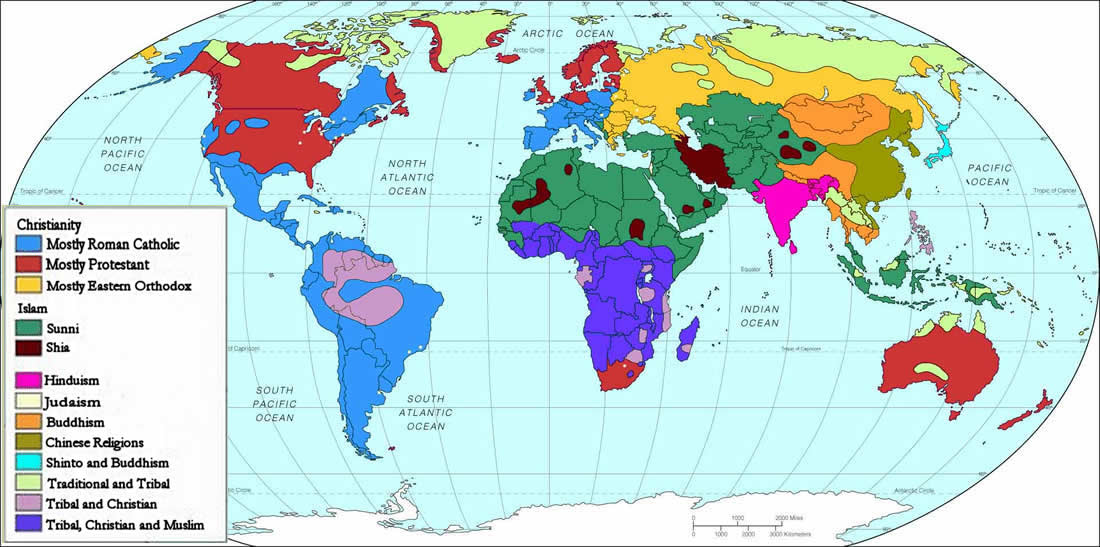
"You will hear things like, 'Science doesn't know everything.' Well, of course science doesn't know everything. But, because science doesn't know everything, it doesn't mean that science knows nothing. Science knows enough for us to be watched by a few million people now on television, for these lights to be working, for quite extraordinary miracles to have taken place in terms of the harnessing of the physical world and our dim approaches towards understanding it. And as Wittgenstein quite rightly said, 'When we understand every single secret of the universe, there will still be left the eternal mystery of the human heart.'"
Stephen Fry quoting Wittgenstein during a Room 101 TV program of March 2001
Religion deals with the truths of the metaphysical world just as chemistry and the other natural sciences deal with the truths of the physical world. The book one must read to learn chemistry is the book of nature. The book from which to learn religion is your own mind and heart. The sage is often ignorant of physical science, because he reads the wrong book - the book within; and the scientist is too often ignorant of religion, because he too reads the wrong book - the book without.
Vivekananda - Religion and Science
There are two worlds, the microcosm, and the macrocosm, the internal and the external. We get truth from both of these by means of experience. The truth gathered from internal experience is psychology, metaphysics, and religion; from external experience, the physical sciences. Now a perfect truth should be in harmony with experiences in both these worlds. The microcosm must bear testimony to the macrocosm, and the macrocosm to the microcosm; physical truth must have its counterpart in the internal world, and the internal world must have its verification outside. Yet, as a rule, we find that many of these truths are in conflict. At one period of the world's history, the internals become supreme, and they begin to fight the externals. At the present time the externals, the physicists, have become supreme, and they have put down many claims of psychologists and metaphysicians.It may be that those who gain "immediate spiritual knowledge" become unusually capable of metaphysical insight alongside possessing enhanced spiritual insight.
Vivekananda
"If one is not oneself a sage or saint, the best thing one can do, in the field of metaphysics, is to study the works of those who were, and who, because they had modified their merely human mode of being, were capable of a more than merely human kind and amount of knowledge."
Human Existence
... you must take the whole society to find the whole man. Man is not a farmer, or a professor, or an engineer, but he is all. Man is priest, and scholar, and statesman, and producer, and soldier. In the divided or social state these functions are parcelled out to individuals, each of whom aims to do his stint of the joint work, whilst each other performs his. Ralph Waldo Emerson
(presented as "one of those fables which out of an unknown antiquity convey an unlooked-for wisdom").
Pythagoras who, according to Heraclides of Pontus, the pupil of Plato and a learned man of the first rank, came, the story goes, to Philus and with a wealth of learning and words discussed certain subjects with Leon the ruler of the Philasians. And Leon after wondering at his talent and eloquence asked him to name the art in which he put most reliance. But Pythagoras said that for his part he had no acquaintance with any art, but was a philosopher. Leon was astonished at the novelty of the term and asked who philosophers were and in what they differed from the rest of the world.
Pythagoras, the story continues, replied that the life of man seemed to him to resemble the festival which was celebrated with most magnificent games before a concourse collected from the whole of Greece. For at this festival some men whose bodies had been trained sought to win the glorious distinction of a crown, others were attracted by the prospect of making gains by buying or selling, whilst there was on the other hand a certain class, and that quite the best class of free-born men, who looked neither for applause no gain, but came for the sake of the spectacle and closely watched what was done and how it was done: So also we, as though we had come from some city to a kind of crowded festival, leaving in like fashion another life and nature of being, entered upon this life, and some were slaves of ambition, some of money; there were a special few who, counting all else as nothing, ardently contemplated the nature of things. These men he would call "lovers of wisdom" (for that is the meaning of the word philo-sopher).
(Pythagoras was an acknowledged wordsmith and is often credited with originating the term "Philosopher")!
Ancient, classical, Greek philosophy also evidences cogent suggestions that human nature is complex:-
Plato was a pupil and friend of the greek philosopher
Socrates. Amongst the many works attributed to Plato's authorship
is his "The Republic", (composed circa 375 B.C.), wherein is set out a series of discourses
that allegedly took place between Socrates and a number of other
persons who variously arrived and departed as the discussions
continued.
It is in this record, made by Plato, of "Socrates? "
philosophising that most intriguing themes are developed -
...can we possibly refuse to admit that there exist in each of us the same generic parts and characteristics as are found in the state? For I presume the state has not received them from any other source. It would be ridiculous to imagine that the presence of the spirited element in cities is not to be traced to individuals, wherever this character is imputed to the people, as it is to the natives of Thrace, and Scythia, and generally speaking, of the northern countries; or the love of knowledge, which would be chiefly attributed to our own country; or the love of riches, which people would especially connect with the Phoenicians and the Egyptians.
Certainly.
This then is a fact so far, and one which it is not difficult to apprehend.
No, it is not. ...
... Others, like seed sown on rocky places, hear the word and at once receive it with joy. But since they have no root, they last only a short time. When trouble or persecution comes because of the word, they quickly fall away. Still others, like seed sown among thorns, hear the word; but the worries of this life, the deceitfulness of wealth and the desires for other things come in and choke the word, making it unfruitful. Others, like seed sown on good soil, hear the word, accept it, and produce a crop ...

How far can it be accepted, in all this evidence of a three-way disposition in human behaviours, that Jesus, (very significantly), in The Parable of the Sower, effectively presents a view of earthly Human Existence that is, (significantly), "broadly shared", by Emerson, Pythagoras, and Plato / Socrates?
Is "Human Being" more truly Metaphysical than Physical?
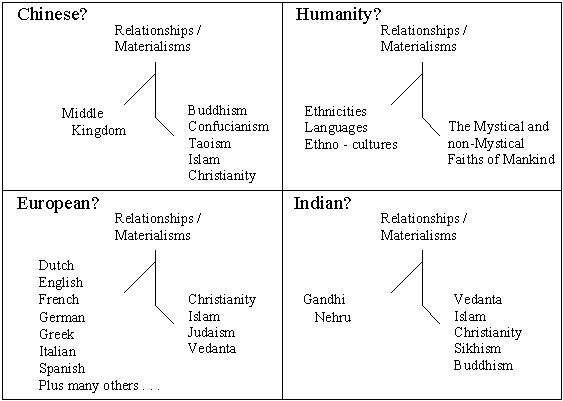 Faith and Philosophy!!! Our Human Nature - Tripartite Soul page Spirituality and the Wider World!!! People may well be spiritual, materialistic, ethnic and intellectual!!! |
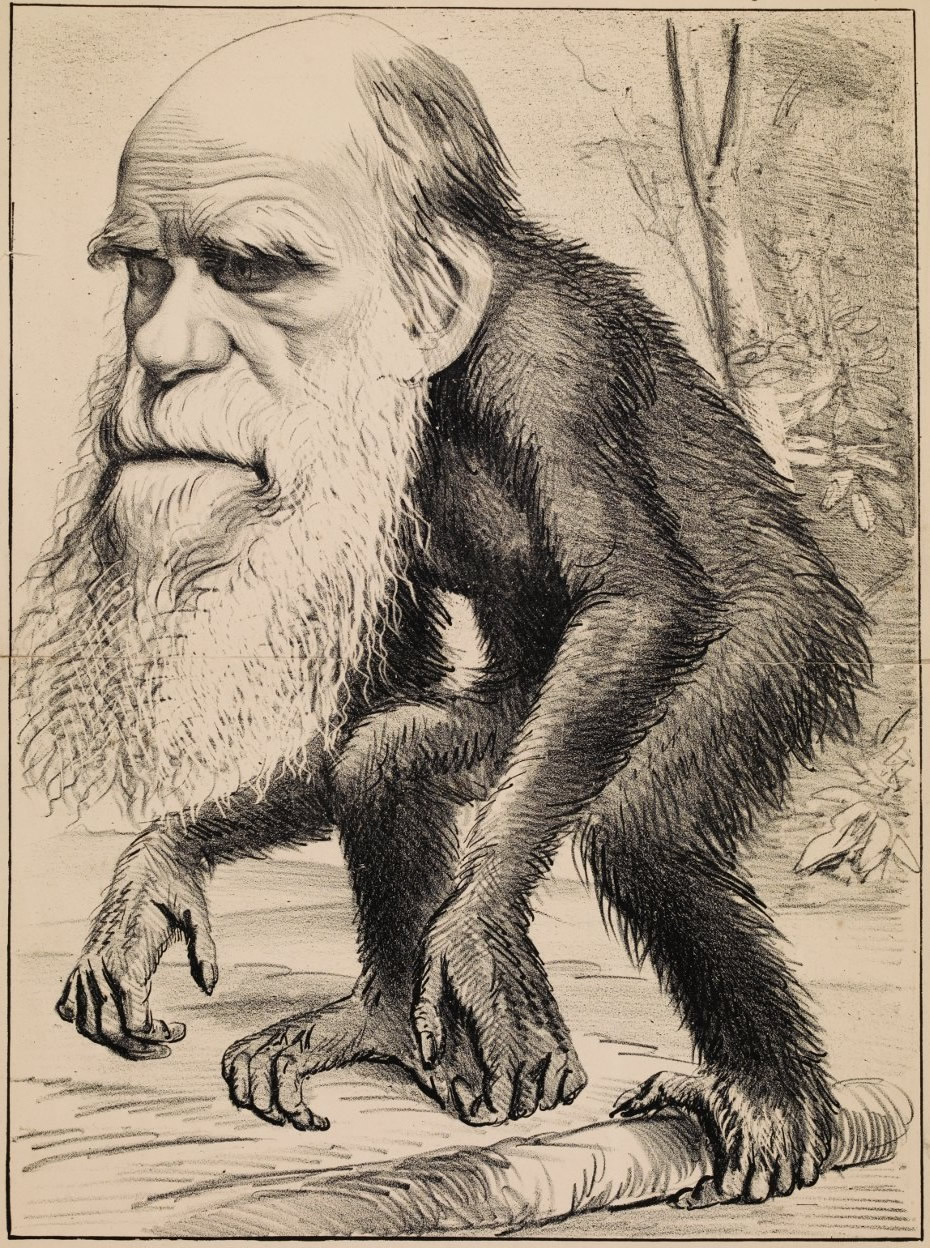 Popular, "Scientific", Rational, inadequate? ~ Darwinism Famous "Hornet" cartoon of 1871 (just after Darwin's ~ The Descent of Man) |
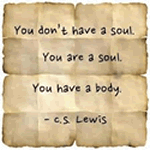


He also said:-If there was "ball-park" agreement about how the Human World "ought" to operate, (thanks mainly to the Humanities), then the Sciences could be brought to bear to effectively seek to attain those aims ~ (alongside inherently desireable advances in such fields as Medicine, Food Production and Global Warming Limitation that we might perhaps hope for from The Sciences in any case).
"Science can only ascertain what is, but not what should be, and outside of its domain value judgments of all kinds remain necessary. Religion, on the other hand, deals only with evaluations of human thought and action: it cannot justifiably speak of facts and relationships between facts."

"We need a worldview grounded in science that does not deny the richness of human nature and the validity of modes of knowing other than the scientific. If we can bring our spirituality, the richness and wholesomeness of our basic human values, to bear upon the course of science in human society, then the different approaches of science and spirituality will contribute together to the betterment of humanity." His Holiness the Dalai Lama
(In a comment on "War of the Worldviews: Science vs Spirituality", a faith vs. reason debate or controversy related book written by the scientist Leonard Mlodinow and by the prominent spiritual writer Deepak Chopra.
Leonard Mlodinow has previously co-authored with Stephen Hawking on scientific subjects).
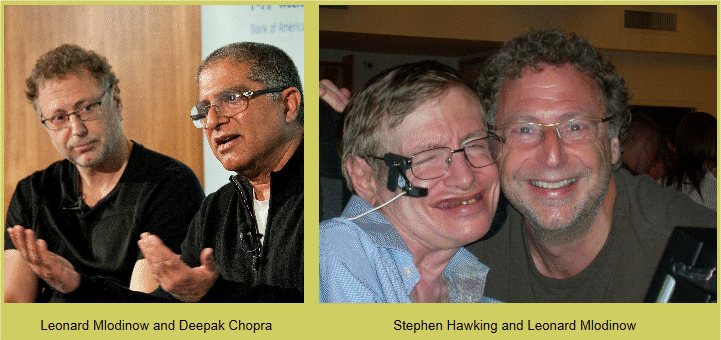

N.B. This page is NOT particularly intended to be a presentation "in appreciation of Emerson".
He was in his own times, and for his own reasons, sincerely a person-of-faith whose works, as has been shown above, can be drawn on to yield many quotes very relevant not only to a demonstration of that sincere faith but also to providing some cogent input into diverse aspects of the Faith vs Reason debate. (Besides which there may well be great potential advantage, in terms of establishing credibility for the content of this page, in attempting to remind "modernity" that such views were held by a notable figure who not only was, but also remains, a source of profound cultural influence).
Our page content will now turn again towards the elusive subject of Metaphysics ~ featuring yet more directly relevant quotes from Emerson.

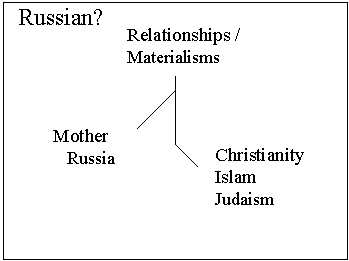
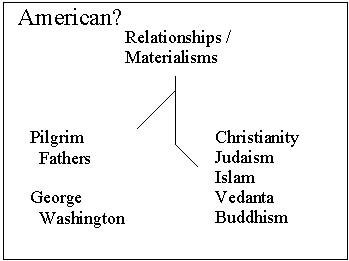
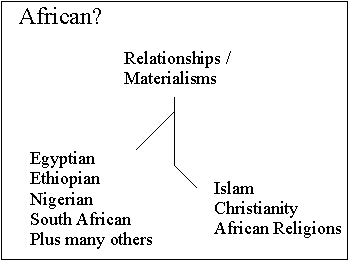

Such originality is itself capable of being shown to be something of an add-on to Emerson's own thoughts (or divinations?):-
"In old Rome the public roads beginning at the Forum proceeded north, south, east, west, to the centre of every province of the empire, making each market-town of Persia, Spain, and Britain pervious to the soldiers of the capital: so out of the human heart go, as it were, highways to the heart of every object in nature, to reduce it under the dominion of man. A man is a bundle of relations, a knot of roots, whose flower and fruitage is the world. His faculties refer to natures out of him, and predict the world he is to inhabit, as the fins of the fish foreshow that water exists, or the wings of an eagle in the egg presuppose air. He cannot live without a world."
Ralph Waldo Emerson
History (an essay of 1841)
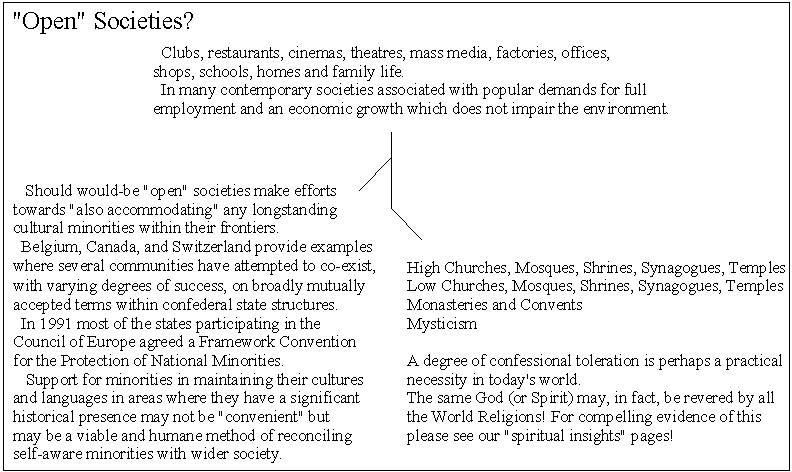
What is the business of history? What is the stuff of which it is made? Who is the personage of history? Man : evidently man and human nature. There are many different elements in history. What are they? Evidently again, the elements of human nature. History is therefore the development of humanity, and of humanity only; for nothing else but humanity developes itself, for nothing else than humanity is free. ...In his essay "History" Ralph Waldo Emerson sets out an approach to History where the "innate Humanity" that is common to all of mankind is seen as operating throughout the ages in the shaping of events.
... Moreover, when we have all the elements, I mean all the essential elements, their mutual relations do, as it were, discover themselves. We draw from the nature of these different elements, if not all their possible relations, at least their general and fundamental relations.
Victor Cousin
Introduction to the History of Philosophy (1832)
"Whatever concept one may hold, from a metaphysical point of view, concerning the freedom of the will, certainly its appearances, which are human actions, like every other natural event, are determined by universal laws. However obscure their causes, history, which is concerned with narrating these appearances, permits us to hope that if we attend to the play of freedom of the human will in the large, we may be able to discern a regular movement in it, and that what seems complex and chaotic in the single individual may be seen from the standpoint of the human race as a whole to be a steady and progressive though slow evolution of its original endowment."
Immanuel Kant
Idea for a Universal History from a Cosmopolitan Point of View (1784)
"There is one mind common to all individual men.
Of the works of this mind history is the record. Man is explicable by nothing less than all his history. All the facts of history pre-exist as laws. Each law in turn is made by circumstances predominant. The creation of a thousand forests is in one acorn, and Egypt, Greece, Rome, Gaul, Britain, America, lie folded already in the first man. Epoch after epoch, camp, kingdom, empire, republic, democracy, are merely the application of this manifold spirit to the manifold world".
...can we possibly refuse to admit that there exist in each of us the same generic parts and characteristics as are found in the state? For I presume the state has not received them from any other source. It would be ridiculous to imagine that the presence of the spirited element in cities is not to be traced to individuals, wherever this character is imputed to the people, as it is to the natives of Thrace, and Scythia, and generally speaking, of the northern countries; or the love of knowledge, which would be chiefly attributed to our own country; or the love of riches, which people would especially connect with the Phoenicians and the Egyptians.
Certainly.
This then is a fact so far, and one which it is not difficult to apprehend.
No, it is not. ...
![]()
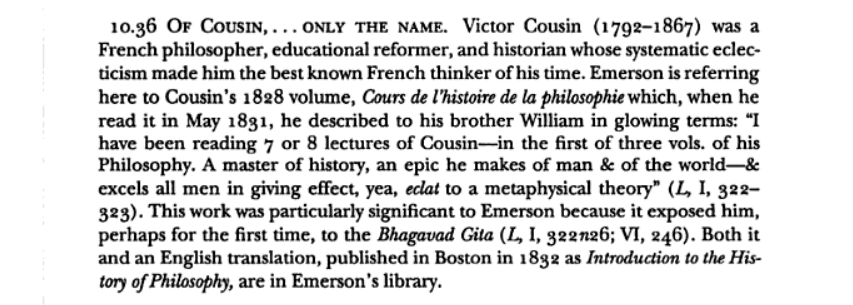
Footnote from - The Collected Works of Ralph Waldo Emerson: English traits, Volume 5
by Ralph Waldo Emerson, Alfred Riggs Ferguson, Joseph Slater - 1971)
![]()
Each nation has its bible more or less pure; none has yet been willing or able in a wise and devout spirit to collate its own with those of other nations, and sinking the civil-historical and ritual portions to bring together the grand expressions of the moral sentiment in different ages and races, the rules for the guidance of life, the bursts of piety and of abandonment to the Invisible and Eternal; - a work inevitable sooner or later, and which we hope is to be done by religion and not by literature.
The Dial, III, July 1842, 82; (quoted in R. K. Dhawan, Henry David Thoreau, a Study in Indian Influence, 1985, 27-28)
![]()
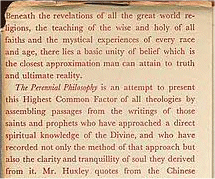
Beneath the revelations of all the great world religions, the teaching of the wise and holy of all faiths and the mystical experiences of every race and age, there lies a basic unity of belief which is the closest approximation man can attain to truth and ultimate reality.
The Perennial Philosophy is an attempt to present this Highest Common Factor of all theologies by assembling passages from the writings of those saints and prophets who have approached a direct spiritual knowledge of the Divine, and who have recorded not only the method of that approach but also the clarity of soul they derived from it.
We have seen it as worthwhile to add another category of quotation ~ where recognition has been given "by the wise and holy of several faiths" to the possibility of Mystical Communion with God ~ as this addition may rather directly tend the range of agreement from Comparative Religion studies about "Core Spiritual Truths" already demonstrated towards actually becoming real evidence of the existence of "Spiritually Discernible" aspects to the one God or Spirit which is central to Mystical Faith.
|
|||||||||
It may be that it will be possible to see any contributions, made on this page, to the Faith vs Reason debate as being consistent with such Sermons and Parables of Jesus as The Sermon on the Mount and The Parable of the Sower.
Given similarities in accepted Spiritual Truth between major religions it is surely reasonable to view with respect the profound spiritualities that exist at the cores of ALL of the enduring and widespread faiths just explicitly mentioned.

Buddhism, Islam, Hinduism, Christianity, Sikhism, Taoism and Judaism
The table of links and the collection of religious symbols displayed above are thus intented to be presented in a manner consistent with aspirations towards promoting a mutually respectful co-existence of The Great Faiths of the World.
| ||||
Start of
The Faith vs Reason Debate